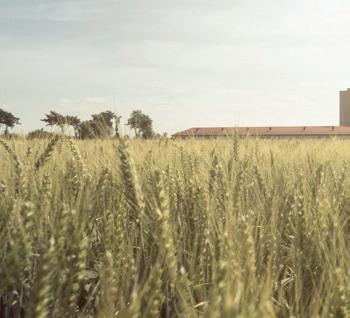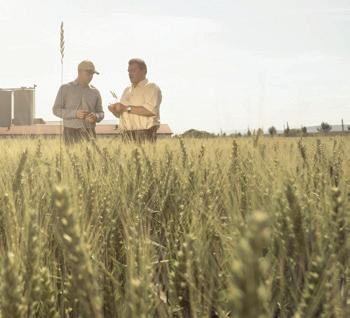
13 minute read
Sustainability at ERBER
SUSTAINABLE GROWTH WITH RESPONSIBILITY
We shape the future.
Advertisement
ERBER Group’s principles are based on sustainable strategies. We feel that it is our job to improve the effi ciency and quality of feed and food safety. Success is not the only thing that is important to us – we have a sustainable approach to topics such as health, food safety, the environment and society.
The strategic framework for these actions is based on the UN’s Sustainable Development Goals (SDGs) as well as its 2030 Agenda for Sustainable Development. The most important topics for this 2017/2018 sustainability report were identifi ed with the help of our stakeholders; ERBER Group’s performance and goals were then set out in line with these topics. We chronicle our success stories, progress, future projects and goals in the ERBER Group sustainability report, which is published once every two years.
We are passionate Pioneers, Partners and Performers who leave foodprints to create a better world for us and our children.

Sustainability at ERBER 102-18
ERBER Group has dedicated itself to achieving a long-term balance between economic success, protecting the environment and social responsibility.
The Sustainability Team for the definition of ERBER Group’s relevant stakeholders it consists of the following members: ERBER Group’s sustainability management and organization is headed by the Executive Board with the support of the "Integrated Management System" and "Corporate Communications ". As sustainability is seen as an integral part of ERBER Group’s business activities, the subsidiaries’ chairs of the executive board and their management are in charge of it – various project teams work on different topics related to sustainability and are key to executing these projects.
Claudia Hajdinyak, Head of Corporate Communications, is in charge of supervising and coordinating the report’s agenda. She is the second-in-command after the Executive Board with regard to organizing the sustainability report. The Management and the Executive Board are involved in all decisions. The Sustainability Team responsible for compiling the report consists of representatives from all of the relevant departments. The sustainability agenda is analyzed, developed further and implemented after undergoing regular monitoring processes to determine its suitability.
Dr. Heinz FLATNITZER
Dr. Eva Maria BINDER Ferdinand HABSBURG, MBA Claudia HAJDINYAK Cristian ILEA, MBA Mag. Herbert KNEISSL Michael FEHRER Birgit LEITNER, MA DI Franziska DORN
Executive Board HR, Corporate Communications & Group Operations Senior Vice President Research ERBER Group Head of Internal Audit ERBER Group Head of Corporate Communications ERBER Group Division Marketing Officer ROMER LABS Chief Marketing Officer ERBER Group Head Group Operations ERBER Group Employer Brand Manager ERBER Group IMS Manager ERBER Group
When compiling this report, we noticed that we have already implemented many successful measures related to sustainability. What is still missing, however, is a clear strategic framework for ERBER Group’s sustainable development. Consequently, we have made it our goal to develop a sustainability strategy for the entire Group by 2021 and to entrench it with lasting effect.
The most important stakeholders

Stakeholder 102-40, 102-42, 102-43
ERBER Group’s stakeholders
Responsible corporate governance is only possible when there is a dialogue with the organization’s stakeholders. Their valuable input allows us to understand the wants, needs and expectations of various interest groups – to ensure balanced reporting on sustainability and as a valuable source of input for ERBER Group’s actions as an organization. During its first meeting about this report, the Sustainability Team sat down together and selected and analyzed all of ERBER Group’s relevant stakeholders. This selection was based on the stakeholders’ influence on and interest in ERBER Group.
Various ways ERBER Group gets its stakeholders involved:
In addition to personalized advice on the optimal use of our products, we also actively involve our customers in product and process decisions. This strengthens their trust in our skills and our organization. This is based on customer events which involve experts. Examples include PROFOR (product forum) or the World Nutrition Forum, which takes place once every two years.
CSR project partners Politicians, Authorities & Lawmakers Media representatives Applicants (colleges, universities, etc.) Retail Employees and their families Owners, Executive Board, Supervisory Board Customers & Suppliers Cooperation partners Financial service providers
ERBER Group and its stakeholders are in contact with one another regularly.
Scientists, customers and managers come together to discuss current developments. We also conduct international customer surveys online once every two years. They allow us to keep track of trends which are then used to determine and analyze specific fields of action.
Our regular online employee surveys (Great Place to Work), our annual ACAM (annual career assessment meeting) and face-to-face meetings with potential employees at job fairs round off the ongoing contact we have with our stakeholders.
In addition, ERBER Group keeps its stakeholders informed about what is currently going on in the organization. We communicate the news through our sustainability report, our website www.erber-group.net, social media, (Facebook, LinkedIn, Xing), balance sheet presentations, press releases and our newsletter.
Relevance from a stakeholder perspective
Economic 1 Ensuring a forward-thinking approach aspects 2 Anti-corruption

Environmental 3 Use of energy during production aspects 4 Use of resources during production and sales 5 Protecting the environment

Social 6 Employment and working conditions aspects 7 Occupational health and safety 8 Education and training
Materiality analysis 102-43, 102-46, 102-47
We used a three-step process to determine the most important topics to be addressed in this report with regard to our management approach and performance.
The fi rst step entailed an analysis of the (upand downstream) value chains of each of our subsidiaries. The criterion used to select the topics we identifi ed as relevant was their potential impact, both direct and indirect, on our business activities. Based on this analysis, we identifi ed 23 topics and then linked them to the topics addressed in the GRI Standards (see the Transition list on page 70).
During the second step, we conducted an in-depth evaluation of these 23 topics. This evaluation entailed an international online survey for our stakeholders and a review of the individual topics by the ERBER Sustainability Team in terms of their environmental, economic and social impact.
We invited 200 people to participate in the stakeholder survey. The survey, which was available in three languages, was sent to customers, suppliers, employees, owners, members of the Supervisory Board, members of the Executive Board, media representatives and cooperation partners. The response rate was approximately 26%.
Anti-corruption



Research partnerships Education and training
Occupational health and safety
Employment and working conditions Use of resources in production and sales Protecting the environment Use of energy during production
Ensuring a forward-thinking approach Business relationships
Market and innovation leadership Use of water and wastewater Use of renewable energy sources Waste Living diversity Observance of human rights Data security Producer responsibility
Food and feed safety
Supplier assessments Local value creation
Mobility and logistics Social responsibility
ERBER Group’s impact
Materiality matrix: The curve depicts the threshold for the implementation of targeted measures. This is the point separating those eight topics which are the core content of this report from the remaining key topics.
The analysis of the topics’ relevance by our stakeholders as well as the Sustainability Team’s analysis of ERBER’s impact are depicted in this materiality matrix. Please note that the results of individual stakeholder groups have been weighted equally and are thus taken into account for the fi nal result.
During the third step, the Sustainability Team discussed the results and agreed on where the threshold for the implementation of targeted measures (shown as a curve in the materiality matrix) would be. On the one hand, the report had to contain at least two topics from the GRI’s three standard disclosure categories (economic, environmental, social aspects) and, on the other hand, it had to be in line with the GRI principle of materiality and not contain too many topics. The following eight topics are the result of a comprehensive materiality analysis and serve as the core content of this report.
Economic aspects:
Ensuring a forward-thinking approach Anti-corruption
Environmental aspects:
Use of energy during production Use of resources in production and sales Protecting the environment
Social aspects:
Employment and working conditions Occupational health and safety Education and training
How ERBER Group sets and sticks to its goals
103-3
ERBER Group defines strategic goals annually which are then used to plan our operations. Our integrated management systems ensure clearly defined processes, ongoing monitoring and targeted implementation. To that end, ERBER Group has established a process system. Correctly identifying these processes and how they relate to each other leads to results which continually optimize our activities within and outside the organization.
Six main processes, Research & Development, Sales & Production, Marketing & Sales and five staff functions, Integrated Management System/ Quality Management, Quality Control, Fusion & Acquisition, Corporate Communication and Internal Auditing report directly to the Executive Board. The six main processes are divided into business processes that are accompanied by supporting processes.
This strategic planning comprises the description of the entire ERBER Group’s business activities with regard to scheduling and functional processing: Roadmaps are drawn up during this strategic planning phase. These roadmaps govern the direction our business takes. The Executive Board meets regularly to discuss these individual steps so that the roadmaps’ requirements are fulfilled. Thanks to a clear and regular reporting structure, it is possible to ensure that the necessary information is shared within the organization. ERBER AG’s Executive Board members report to the Supervisory Board on a quarterly basis.
MANAGEMENT PROCESS
General Management
Staff Functions (STF)
IMS/QM Quality Control Group Strategy / M&A
Corporate Communications Internal Audit
Research + Development (R+D)
Finance + Controlling (F+C)
BUSINESS PROCESSES
Procurement + Production (P+P)
SUPPORTING PROCESSES
Human Resource Management (HRM)
Sales + Marketing (S+M)
Information, Communication, Technology (ICT)
ERBER Group’s integrated management system
The integrated management system not only consists of quality measures, it also contains safety, health, environmental and ethical standards. In addition to fulfilling administrative and legal requirements, this system also meets our customers’ requirements. All of the requirements related to quality, safety, health, environmental and ethical standards are supplemented by and summarized in our ERBER Group organizational standards.
Thanks to annual audits, we are able to review our integrated management systems’ monitoring efficacy and keep improving them. Internal Auditing and the in-house Integrated Management System auditors work together with various certification agencies, customers and authorities to ensure compliance with these standards. All colleagues in charge of monitoring the systems compile management reviews on a quarterly basis. These reviews are done to evaluate and ensure ongoing improvement of the integrated management system. Quality – We boast a process-oriented quality management system to fulfill our predefined quality standards.
Environment – It is ERBER Group’s goal to raise awareness about environmental topics such as reducing CO 2 , energy use and waste management. We urge all of our employees to get involved in these environment-related activities.
Occupational health and safety Using guidelines that are structured both within and outside of the organization, we wish to ensure the health, safety and well-being of all of our employees.

Ethics – We strive to improve our business practices in terms of responsibility, sustainability and ethics while ensuring that our corporate values are being reflected in all of our activities.
ERBER Group certifi cations
103-3
ERBER Group is convinced that most of our success depends on ongoing improvements to our internal quality standards. Our customers’ trust is very important to us here at ERBER Group. When they make purchases, they trust that they will receive products and/or services they can rely on and that these products and services meet or even surpass their expectations.
What is the best way for us to maintain this trust in the quality of our products? We have implemented all the quality management systems that are relevant for our business with high-quality feed additives, diagnostic products and services, and they have also been certifi ed by a third-party organization.
ISO 9001 C E R T I F I E D
ISO 9001 provides the basis for additional standards specifi c to the industry that have been implemented across ERBER Group divisions.
ISO 14001 C E R T I F I E D Additionally, ERBER Group has implemented an environmental management system in Austria and Brazil which is based on ISO 14001 .
ERBER Group organizes many events for customers worldwide. Sustainability in practice is particularly important in that regard. This is why we have implemented ISO 20121 and have certifi cation.
In the following paragraphs, we will list the additional certifi cation standards specifi c to the industry by each division:
BIOMIN
ERBER Group is aware of the fact that premium feed is a cornerstone of high-quality food.
This is why we’ve introduced the HACCP-System at our production sites, so that we can guarantee the quality assurance that our customers want. HACCP is the systematic approach used by ERBER Group to ensure that we produce safe food. The role of the HACCP concept is to examine the dangers associated with food processing or ready-made products and to assess potential risks. When we are aware of all the factors that could cause contamination, we can then implement the necessary measures to eradicate these risks. The aim of the HACCP concept is to initially understand what the possible risks are and how they can be avoided. H A C C P A PPROVED
Local and international quality standards for feed such as GMP+, FAMI-QS and QS guarantee the highest control and quality standards for all of ERBER Group’s (feed) products – from procuring raw materials to the fi nished product.
The pastus+ certifi cation program is a quality assurance program whose aim is to implement unifi ed quality criteria which surpass legal minimum standards. This is to meet the requirements of certifi cation programs in the food industry (e.g. the Austrian AMA-Gütesiegel) in a manner that is transparent at every step of the marketing process.
ABG (Austrian Bio Garantie) These products comply with the European Council Regulation (EC) No 834/2007 and implementing rules, as amended, as well as with the “organic production” directive, as amended, and their sales description indicates that they were produced organically.
A-Futter Quality assurance program for feed (Bavarian Product Standard for Feed Production). A-Futter is a safety system for compound feed. It is the basis of the "Geprüfte Qualität” [verifi ed quality] program in Bavaria. Farms which participate in the "Off ene Stalltür” [literally translated as: “Open stable door”] program, are required to only use A-Futter certifi ed feed.
FIAAA The Feed Ingredients & Additives Association of Australia is the national industrial organization that represents the suppliers of feed additives in Australia. This certifi cation guarantees the quality of FIAAA members’ products.
Additional certifi cation took place in line with ISO 14040 "Life Cycle Assessment". By optimizing feed conversion and improving livestock performance, it is possible to reduce greenhouse gas emissions in livestock production. For this reason, we have introduced a complete life cycle analysis in accordance with ISO 14040 and ISO 14044 to quantify the environmental impact our products have during their entire life cycle. ISO 14040 Approved Life Cycle Assessment
ROMER LABS
ISO 17025 is the standard that has been implemented in all of our analytic service laboratories around the world. This standard determines the technological requirements of a testing laboratory, and it describes in detail how analytical service laboratories are to be managed to ensure high-quality results that are comparable internationally and use the most modern methods available.
Our SEDEX (Supplier Ethical Data Exchange) certifi cation promotes a responsible supply chain.
The aim of a carbon neutral organization is that all processes (employee activities and facilities) are carbon neutral: As an additional way to protect the environment, ROMER LABS off sets its greenhouse gas emissions. NEUTRAL
SANPHAR
Certifi ed according to GMP (Good Manufacturing Practice) for veterinary products and additives. We have introduced the most advanced techniques during the production process to ensure the highest control and quality standards for our products – from the registration of raw materials to the fi nished product.






